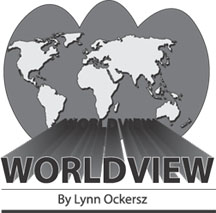|
observer |
|
|
|
|
|
OTHER LINKS |

|

|

|
Persian Gulf in the eye of big power politics
"We're pressing Iraq's leaders to take bold measures to save their country. We're making it clear that American patience is not unlimited". The words are those of a seemingly irate US President George Bush. The incident is highly illustrative of the manner in which domestic political compulsions impinge on a state's handling of foreign relations. To be more specific, what is apparently troubling the US President is the November 7 US Congressional elections. The death toll of US servicemen in Iraq has spiked in October and US public opinion is increasingly critical of Bush's handling of the Iraqi situation. So vocal and widespread is this criticism that it is feared that the Republicans would sustain heavy losses at the upcoming poll, with the rising strong possibility of the Republicans losing control of Congress. Hence Bush's rhetorical blast to his constituents on the intensifying Iraqi conundrum. It could be seen as a Kneejerk reaction of the President to his party's declining political fortunes. However, the Iraqi situation has acquired such a complexity that the question could be posed: What are Bush's options in Iraq? Could the US "cut and run", in Iraq in the face of mounting US casualties? Could the US impose a 'schedule' of tasks on the Maliki administration, as it is rumoured, and expect the latter to pliantly adhere to it? In other words, could the US freely dictate terms to the Maliki government in its anxiety to reduce and contain its political and human costs? These are just some of the troubling posers for the Bush administration. However, the tenacity with which the US is operating in this part of the world in pursuit of its interests would compel the impartial observer to dismiss Bush's fulminations on Iraq as nothing more than pre-election bombast. For, the President was quoted saying that he would bring US troops home tomorrow "if I did not think our mission in Iraq was vital to American security". It is the US security dimension and the importance attached to it by Washington that compels the observer to dismiss the US President's outbursts against the Maliki government as an attempt at mollifying his home constituency in the run up to Congressional elections. Not only will the pressure be reduced on Maliki after the poll but an attempt would also be made to fine-tune the US military operation in Iraq. In other words, as long as the "war against terror" is seen as vital to US interests, the chances are that the US presence in West and South West Asia would not only intensify but also spread. Afghanistan could be considered as symbolising these trends. In the Afghan theatre the US and its allies could be considered as enjoying, commonality of purpose. And what is this grand purpose? Put simply, it is the expansion and consolidation of the Western presence in the Persian Gulf region. Put precisely, it is a NATO presence. The story that is unfolding in Afghanistan and the Persian Gulf is by no means a new one. It has been unfolding in slow stages from the time of the Soviet invasion of Afghanistan in 1979. With the explosive emergence of the Islamic Revolution in Iran in 1979, the US suffered a setback in the Persian Gulf region, which is of course, a vital source of Western oil supplies and of considerable relevance to Western big business. Until the Islamic upsurge in Iran, the Shah of Iran was faithfully safeguarding Western interests in the region. The Soviet invasion of Afghanistan, gave the US a much-needed excuse to reassert its presence in South West and West Asia. The Mujahedin war in Afghanistan backed by the US was a function of this interplay of interests. The subsequent crumbling of the Cold War and the withdrawal of Soviet forces from Afghanistan enabled the Western military alliance to reassert its presence in the region. The US invasion of Iraq is an attempt to further consolidate US interests in the region. Therefore, the US would stay put in Iraq for the foreseeable future. For, the stakes in the region for the US are huge and alluring. |









